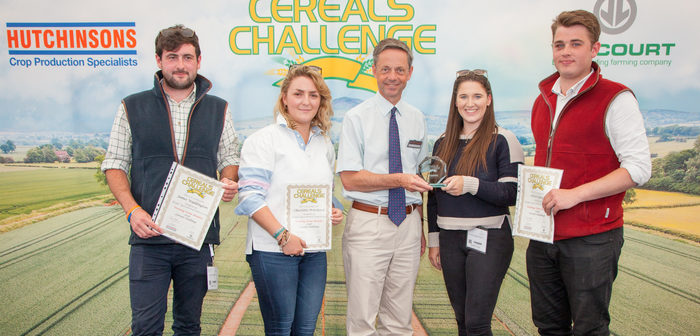The team from the Royal Agricultural University have won the 2018 Cereals Challenge by growing the best crop of virtual winter wheat. Newcastle University took second place closely followed by Harper Adams University.
The winning team made up of Tania Coxon, James Waddington, Charlotte Pritchard and Oliver Carrick were presented with the prestigious Cereals Challenge trophy and £1000 prize money to share, plus an additional £500 for the College, by David Hutchinson, Hutchinsons chairman, at an awards ceremony at the Cereals Event.
Back in February, teams from Nottingham University, Newcastle University, Harper Adams University, Writtle University College, Hartpury College and the Royal Agricultural University were presented with this year’s Challenge where the scene was set to grow the best plot of winter wheat on land that has a resistant black-grass challenge and is following a crop of oilseed rape leaving Clearfield volunteers to manage.
The RAU team chose to grow Evolution on the basis of the variety’s good tillering capacity and black-grass competitiveness. The crop was drilled in early Nov to allow for an application of glyphosate for weed control prior to drilling.
As the season progressed the team amended their fungicide and nutritional plans to reflect the difficult spring conditions, which they believe made the difference.
The judges Dick Neale of Hutchinsons and Keith Norman of Velcourt agreed putting down the winning formula to the team’s consistently good and robust approach to manging the crop throughout what has been a very challenging season.
They underlined the importance of the experience in taking part in the Cereals Challenge for young people considering careers in farm management or agronomy, in order to understand the value of good technical information and agronomic advice in profitable crop production.
Charlotte Pritchard, part of the RAU team who is studying for a FDSc in Agriculture and Farm Management and is in her second year, believes that taking part in the Cereals Challenge has given her first-hand experience of what it would be like to work as an agronomist.
“It has also has been an excellent opportunity to be working and learning alongside leading industry experts such as Dick Neale and Keith Norman. It was certainly well worth the commitment and hard work throughout the season, and I would encourage anyone considering a career in agronomy or crop production to take part, “she says.




